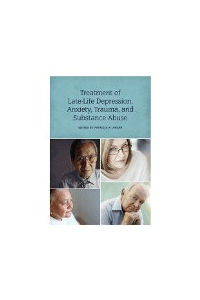“Treatment of Late-Life Depression, Anxiety, Trauma, and Substance Abuse”

“Treatment of Late-Life Depression, Anxiety, Trauma, and Substance Abuse”
Edited by Patricia A. Arean
American Psychological Association
Washington, D.C., 2015
State-of-the-art resource focuses on geropsychology
Reviewed by James K. Luiselli, Ed.D., ABPP, BCBA-D
This eight-chapter book compiles essential knowledge and practice recommendations in the field of geropsychology. Editor Patricia A. Arean notes correctly that healthier lifestyles notwithstanding, our aging population is in need of more extensive, cost-efficient, and effective mental health services.
Problems of depression, anxiety, alcohol misuse, substance abuse and declining cognitive ability are some of the challenges typically encountered by elderly clients.
The book begins with an informative chapter about competency-based training models in geropsychology. The basis of such training appears to be a biopsychosocial approach to health and wellness, combined with context-focused treatment planning and intervention.
In function, this chapter serves as a training roadmap for psychology students and professionals specializing in behavioral healthcare with older adults.
Chapters in the book that address intervention for late-life depression emphasize cognitive behavior therapy, behavioral activation, problem solving treatment and interpersonal psychotherapy.
The various chapter authors uniformly advise that the cognitive element among these therapeutic modalities demands procedural adjustments when dealing with the common sequelae of aging. The most notable characteristics in this regard are slower processing speed, difficulty with memory, communication limitations and diminished sensory perception.
Cognitive behavior therapy and problem solving treatment are also described for generalized anxiety disorder. There are explanations about the benefits of relaxation training, mindfulness-meditation, acceptance and commitment therapy and psychopharmacology.
Exposure therapy is presented as the treatment of choice for posttraumatic stress disorder, while the chapters on alcohol misuse and substance abuse consider assessment screening, motivational interviewing and relapse prevention.
This book appeals on many levels, starting with a consistent chapter format that reviews the supportive research for specific disorders and treatment methods. The chapters also examine conventional and more recent innovations toward intervention, with meaningful clinical suggestions and an illustrative case description.
he uniformity of presentation within and between chapters is another highlight.
Readers will be educated further about the cultural, disability, and brain-behavior influences that affect older adults in need of psychological services. An essential key point, and perhaps the dominant take-home message from the book, is that geropsychology professionals should concentrate on a person’s functional status and life circumstances, not merely chronological age.
recommend this book as a state-of-the-art resource for psychologists in training and practitioners who treat older adults. The book could easily be a primary text within a clinical psychology course at the graduate level or adopted for seminar training in doctoral internship and postdoctoral fellowship programs.
In addition to the hard facts of research-to-practice translation, the book affirms a sensitivity and humility that mental health professionals must possess and demonstrate for improving the quality of life of elderly individuals.
James K. Luiselli, Ed.D., ABPP, BCBA-D, is Chief Clinical Officer, Clinical Solutions, Inc. and North East Educational and Developmental Support Center, Tewksbury, Mass..
Learn more about the book: Treatment of Late Life Depression, Anxiety, Trauma, and Substance Abuse
